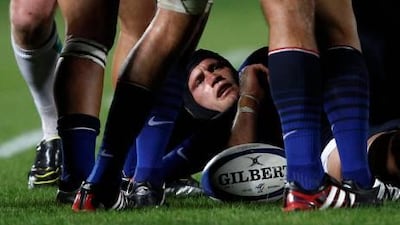New Zealand, the world's best side, lost none of their lustre by having a weekend off as the next six teams in the International Rugby Board's rankings showed exactly how much better the All Blacks are ahead of the World Cup next month.
Defence and fitness were the themes to come out of Saturday's rugby action as the previous two World Cup winners flagged against more dynamic and uncompromising sides.
South Africa, the current holders of the Webb Ellis Trophy, were beaten 14-9 by Australia in Durban, while England huffed and puffed their way to a humiliating 19-9 loss to Wales in Cardiff.
France almost blew a 13-3 half-time lead against a stubborn Ireland side in Bordeaux and, if it was not for the accurate kicking and composure of Dimitri Yachvili, the Irish may have sneaked only their second win against the French in eight years.
New Zealand have lost just one match in their last 23, the 26-24 reversal to Australia in a dead Bledisloe Cup rubber in Hong Kong in October, and Graham Henry, the All Black coach, would have seen little in Durban to concern him before the Tri Nations encounter against South Africa in Port Elizabeth on Saturday.
Peter de Villiers, the Springbok coach, named a side bristling with experience, and with 810 caps between them, the XV that took to the King's Park turf were the most streetwise side South Africa had seen.
De Villiers had recalled his front-line troops after sending an understrength squad to compete in the opening rounds of the Tri Nations in Australia and New Zealand.
After two heavy losses he named what appeared to be the XV that would line up against Wales in Wellington on September 11.
Many of the match-day squad had not played since the Super 15, and in Heinrich Brussouw and Fourie Du Preez, the coach had two players who were starting their first internationals for nearly two years.
Despite this apparent lack of game time, South Africa enjoyed a 6-0 advantage at half-time. Australia's superior fitness and ability to think under pressure eventually told as they generated momentum through the game's only try when Pat McCabe touched down in the 47th minute.
"At half-time we talked about adjusting out support lines and about maintaining ball. We knew that a lot of the Springboks had not played in a while and we hoped to exhaust them and profit," Robbie Deans, the Wallabies coach, said.
It was a synopsis that De Villiers agreed with. The Springbok coach blamed the seven-week layoff many of his players enjoyed as much as the fact that he had made 13 changes to the side that lost 40-7 to New Zealand two weeks ago in Wellington.
"We controlled the game in the first half, but it just shows that if you don't take the chances that come your way, it is very difficult," he said. "The physical state we were in meant that we couldn't keep up the pace in the second half."
It was a similar story at the Millennium Stadium. Martin Johnson, the England coach, had picked what he believed was his strongest line-up, and it looked to be the case in the opening exchanges as England dominated in almost all facets of the game.
So on top were England initially that Mike Tindall, the captain, spurned a total of five chances at goal as England pounded the Welsh try line. With 65 per cent of possession and 75 per cent of territory in the first half, Toby Flood's two penalties were a risible return as England went into half time level at 6-6.
Wales have twice been to Poland this summer, undergoing a rigorous training regime that started often at 5.15am, and which included up to eight sessions a day.
Last week, after the 23-19 defeat against England at Twickenham Jamie Roberts, the Wales centre, believed his side were much the fitter.
And so it proved as Wales, reduced to 14 men for 20 minutes of the second half, after yellow cards were shown to Roberts and Mike Phillips, and without Gavin Henson due to a wrist injury, outscored England 13-3 and registered the only try of the match through James Hook.
England made 12 visits to Wales's 22, yet the home side's scramble defence was monumental.
At one point, Matt Banahan, the England centre, thought he could simply trundle through Shane Williams, 31cms shorter and 35kg lighter, but Williams held up his opposite number as they crashed over the try line together.
"Our players have been through a lot of pain in the past few months," Warren Gatland, the Wales coach, said.
"They just kept working. One thing we have stressed to the players is that when they are under pressure you have got to concentrate on the next scrum, the next line-out. I couldn't fault the effort."
It was England's seventh defeat from 11 matches away from Twickenham under the guidance of Johnson, who took the reins of the national side in 2008.
It brings into focus the appalling record England have on the road since Sir Clive Woodward walked out on the English Rugby Football Union in 2004.
Both South Africa and England, the 2007 finalists, will get better, as, although the squads have both been training hard, it was the first time that their first-choice players had featured together this season.
South Africa can take heart from the fact that they have already beaten New Zealand on home turf in the past few years.
For England, though, only the narrow 21-20 victory over Australia in June last year gives them the slightest hope of any success at the World Cup, which starts on September 9.
Follow us

